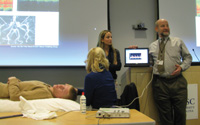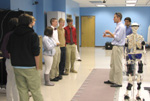|
By Dawn Brazell
Public Relations
Little did Fort Dorchester High
School senior Michael Sweet
realize that he would be asked to
hyperventilate on a school visit
to MUSC. Obeying the odd request,
Sweet listens for the next
instructions from Robert Adams,
M.D., who is interpreting the
results of the transcranial
doppler ultrasound that's being
done.
He lets Sweet
know he's in good shape with nice
young elastic blood vessels. Given
that Adams holds a SmartState
Endowed Chair in Stroke and
directs the South Carolina REACH
(Remote Evaluation of Acute
Ischemic Stroke) Network, this is
good news indeed.
Sweet was one
of 27 students from Fort
Dorchester High School who visited
MUSC's Bioengineering Building and
Center for Rehabilitation Research
in Neurological Conditions on Nov.
2 to learn more about stroke as
part of their term project for the
biotechnology class. This event
followed up on their teacher Ben
Bertolet's summer experience at
MUSC as part of the STEM (Science,
Technology, Engineering, and
Mathematics) Program for high
school science teachers. Bertolet
was hosted for his summer visit by
the Clemson-MUSC Bioengineering
Program.
Bertolet said the day was amazing.
 Fort Dorchester
High School student Michael
Sweet, left, volunteers to help
demonstrate a transcranial
doppler ultrasound. Judy Luden
performs the procedure as Dr.
Robert Adams, right, explains
the procedure. Also pictured is
Dr. Lidia Yamada. Fort Dorchester
High School student Michael
Sweet, left, volunteers to help
demonstrate a transcranial
doppler ultrasound. Judy Luden
performs the procedure as Dr.
Robert Adams, right, explains
the procedure. Also pictured is
Dr. Lidia Yamada.
Many of the
students have family members who
have suffered or died from a
stroke. "Any time you can
establish connections between what
is learned in the classroom and
the outside world, students derive
significant meaning and
understanding. The field trip
provided my students with a
relevant learning experience and
shed insight into how engineers
help to better mankind through the
use of technology."
Students
learned about the biomedical basis
and risk factors for
stroke and the latest in
treatment and rehabilitation for
victims.
"Knowledge is
power. Experiences like these
also provide students with a spark
for a future career in
engineering. They might have a 'I
could do this' or 'I want to do
this' epiphany."
Bertolet
praised The Education Foundation,
an initiative of the Charleston
Metro Chamber of Commerce, which
received funding from Boeing to
write a curriculum for a "STEM in
the Workplace" class. The class
exposed around 100 math and
science teachers to local
industries and businesses that
offer STEM jobs. It emphasized
project-based learning and the
benefits that educational style
has for students. Bertolet's
particular project was on stroke
awareness.
"Programs like
'Project Lead The Way' are trying
to carve the path for the
innovation generation. We are
in a STEM crisis in this
country, and the need for bright
young minds in these fields is
higher than ever before."
MUSC medical leaders agree.
 ort Dorchester High
School students broke into three
groups to tour the Center for
Rehabilitation Research in
Neurological Conditions. ort Dorchester High
School students broke into three
groups to tour the Center for
Rehabilitation Research in
Neurological Conditions.
The day began
with Adams and Lidia Yamada, M.D.,
describing medical aspects of
stroke and its prevention. Adams
and Judy Luden, the Neuroscience
research program coordinator, then
demonstrated some of the latest
technologies for stroke diagnosis.
After an overview of stroke
rehabilitation research by Steven
Kautz, Ph.D., director of research
for the College of Health
Professions, the students had
interactive visits at three
laboratories in MUSC's Center for
Rehabilitation Research in
Neurological Conditions including
Locomotor Energetics and
Assessment (Jesse Dean, Ph.D., and
Cameron Nott, Ph.D.), Locomotor
Rehabilitation (Mark Bowden,
Ph.D.), and Upper Extremity
Function (Michelle Woodbury,
Ph.D.).
Richard Swaja,
Ph.D., director of the
Clemson-MUSC Bioengineering
Program and coordinator for this
event, said the visit was
successful by all measures.
"The students
learned about stroke from
clinicians at MUSC's
nationally-recognized Stroke
Center and about state-of-the-art
rehabilitation research being
conducted in the College of Health
Professions. The MUSC staff
presentations and demonstrations
were absolutely great and
maintained the students' attention
and enthusiasm throughout the
day. The MUSC clinicians and
scientists also enjoyed
interacting with the students."
Having a
facility like the bioengineering
building for such functions helped
immensely with regard to
audio-visual and interactive
meeting capabilities," he said.
"It is fitting
that much of the event was
conducted in the new facility
since stroke research is such a
multi-disciplinary endeavor just
like bioengineering."
Swaja said this
type of outreach is valuable in
that it reflects the commitment
and involvement of MUSC in
community development and
education at all levels.
"It provides
students at a critical stage in
their development – high school
juniors and seniors who are
thinking about college and careers
– with real world experience and
exposure to opportunities in
biomedicine. Activities where high
school students can meet and
interact with
nationally-recognized scientists
and graduate students and
experience vibrant and relevant
research and clinical environments
can have dramatic impacts on
career choices and directions."
|



 Fort Dorchester
High School student Michael
Sweet, left, volunteers to help
demonstrate a transcranial
doppler ultrasound. Judy Luden
performs the procedure as Dr.
Robert Adams, right, explains
the procedure. Also pictured is
Dr. Lidia Yamada.
Fort Dorchester
High School student Michael
Sweet, left, volunteers to help
demonstrate a transcranial
doppler ultrasound. Judy Luden
performs the procedure as Dr.
Robert Adams, right, explains
the procedure. Also pictured is
Dr. Lidia Yamada. ort Dorchester High
School students broke into three
groups to tour the Center for
Rehabilitation Research in
Neurological Conditions.
ort Dorchester High
School students broke into three
groups to tour the Center for
Rehabilitation Research in
Neurological Conditions.